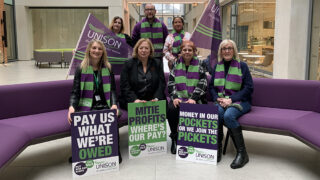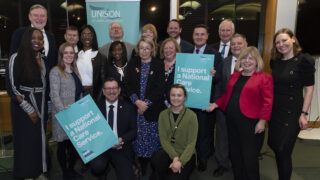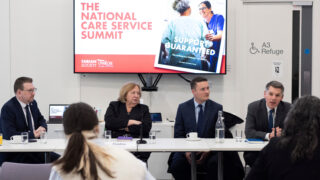More than half of care workers employed in the private sector receive under £100 a week if they take time off sick, with many getting nothing at all, a UNISON survey reveals today (Thursday).
The results highlight the precariousness of low-paid care staff in unstable employment who fear the consequences of taking time off when ill, the union says.
Many who were poorly during the pandemic have had to use up savings, rack up credit card debt or use annual leave as they had so little money to live on.
Some say they were pressured to go to work when they should have been isolating, having been in contact with someone with the virus. Others were ordered in even when they had tested positive.
More than 2,000 people working in social care – and employed either by private companies or in the not-for-profit sector – took part in the survey.
Nearly half (48%) said that they normally only receive statutory sick pay (SSP, currently £99.35 a week) if they’re absent due to ill health. And a further one in twelve (8%) say they get no pay at all.
During the pandemic, the government provided extra funding through the infection control fund (ICF) that was designed to top up wages in the care sector.
Even with this additional money – now withdrawn – more than a third (36%) of those surveyed say they did not get full pay if they were ill or isolating.
Of those whose pay was reduced, more than a third (35%) have had to fall back on their savings to see them through their sickness or isolation, and around one in eight (13%) have had to add debts to their credit cards. One in six (17%) have borrowed from family or friends.
More than a third of the respondents (37%) say they had used up annual holiday to avoid losing pay. Nearly a quarter (24%) say they ran into debt because they lost money by taking time off sick.
One in 15 (7%) say they carried on going into their workplace, despite the risks, after testing positive for Covid because they could not afford for their wages to be cut.
One in eight (12%) say they were put under pressure from their employer to carry on working when they should have been isolating – often because they were told they might be sacked or disciplined for taking time off.
And one in 20 (5%) say their employer pushed them to work even when they had a positive test result, risking virus spread to colleagues and vulnerable people in their care.
UNISON says the survey results show how the sick pay system needs fundamental reform. Staff need to stay off work when they are ill for good reason, so they don’t put others’ health in jeopardy, says the union.
The cost of living crisis has made it all the more vital that privately employed care staff are given full pay when poorly because many simply can’t afford to stop working otherwise, UNISON says.
UNISON general secretary Christina McAnea said: “The pandemic has shown up massive inequalities in social care.
“Care staff employed by local councils often have good sick pay arrangements. But most in the sector work for private employers where full sick pay is a rarity. This means huge numbers are left high and dry if they’re unfortunate enough to fall ill.
“Many care workers had no choice but to use up money they’d put by or run up debts on their cards.
“Social care is already in crisis with thousands of vacancies. Care workers are jumping ship for less stressful jobs with better wages where full sick pay is standard.
“Ministers should show they are committed to real reform by ensuring all workers are given full pay when ill or isolating. It should be a basic right for everyone, no matter where they work.”
Notes to editors:
– Comments from care staff in the survey include:
- “I went into arrears with my credit card because I wasn’t being paid. I had to consolidate the debts to manage payment and it’s now impossible for me to get any more credit.”
- “I was off for three weeks with Covid and all I received was SSP. It meant I had to be really careful about spending over the following two months. Work offered no support, even though I caught the virus from a client.”
- “I had to isolate twice. Once because a family member got Covid and a second time when I got the virus myself. This had a massive impact on my wages and had to cut back on heating, food and missed bills”
- “My employer doesn’t pay sick pay for the first three days, so the following month after being ill I was nearly £200 short. Colleagues have said they would work while infected because they can’t afford to lose the money.”
- “I had to use my savings from the overtime I worked. It means all that hard extra work I put in was all undone.”
- “I was off three times last year. Twice because of Covid, which I caught at work, and once because I lost my mother after a short battle with cancer. When my my gran died, I couldn’t afford to take time off. I’ve had to stop taking driving lessons and I’ve given up any notion of moving out of my parents’ house. I’ve had to use my savings and I’m now currently moving money around accounts to make ends meet. Plus, I’ve racked up £2,000 on my credit card that I’ve only had for a year.
- “When I was isolating, I dropped £300 in weekly wages. It means I have to watch every penny.”
- “I was ill for eight weeks and I received the equivalent of one week’s pay. Luckily, we had some savings but at the end of the illness they were very much depleted.”
- “With no income while I was sick, I had to buy less food. I had to borrow money off my eldest daughter. I felt ashamed to be borrowing money from my own daughter.”
– The survey of UNISON members took place from 6 to 22 April 2022. It was completed by 2,136 people working in social care and employed either by private companies or in the not-for-profit sector.
– Statutory sick pay is £99.35 for a week, equivalent to £2.83 an hour for a 35-hour contract. It is not paid for the first three days of absence, although this was temporarily changed during much of the pandemic so it was payable from day one.
– UNISON is the UK’s largest union with more than 1.3 million members providing public services in education, local government, the NHS, police service and energy. They are employed in the public, voluntary and private sectors.
– Sick pay is among the issues being discussed at the union’s annual conference takes place at the Brighton Centre from 14 to 17 June and the cost-of-living crisis, public sector pay and violence against women at work will be among the topics debated.
Media contacts:
Anthony Barnes M: 07834 864794 E: a.barnes@unison.co.uk
Liz Chinchen M: 07778 158175 E: press@unison.co.uk



